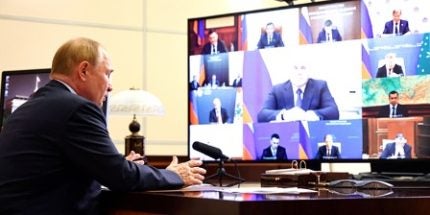
During an online meeting of the Russian government which discussed the effect of sanctions, President Vladimir Putin heard reports from various ministers. He noted that Russia, in response to the unfriendly actions of a number of countries, had imposed restrictions on the import of agricultural products which initially increased prices but ultimately contributed to the development of agriculture within Russia itself.
“Part of the same thing is happening in industry.… It is not the same thing, of course, but nevertheless an analogy and such comparisons are quite appropriate,” he said. “Here is what I would like to say in this regard. Russia is the leader in reserves of a number of strategic raw materials: natural gas accounts for almost 22% of world reserves, gold – almost 23%, diamonds – almost 55%.”
He then addressed Prime Minister Mikhail Mishustin: “Mikhail Vladimirovich, I have a request for you, please look at some types of goods that we supply in large quantities to the world market, we are limited in the supply of a number of goods – maybe we should also think about certain restrictions? Uranium, titanium, nickel….
Strategic reserves are being created in some countries, and some other measures are being taken. But in general, if this does not harm us, then I’m not saying that we need to do this tomorrow. But we should also think about certain restrictions on supplies to the foreign market not only of those goods that I have named, but also of some others.”
He added: “I’m not going to talk about the reasons now, I think that my colleagues in the Government understand perfectly well what the value of Russian raw materials is in these positions, which I named: just what came to mind: uranium, titanium, nickel, but there are others.” He asked Mishustin to “please report separately and think about it”.
In May, the US signed into law the Prohibiting Russian Uranium Imports Act banning the import of unirradiated, low enriched uranium (LEU) that is produced in the Russian Federation or by a Russian entity. The ban entered into force in August and will remain in place until the end of 2040. A waiver process was put in place to ensure US NPPs do not face supply disruptions while the US works to build up its domestic LEU capacity.
According to the US Energy Information Administration, Russia has been supplying about 24% of enriched uranium used to fuel the US fleet of 94 commercial reactors Russia has roughly 44% of the world’s uranium enrichment capacity and supplies approximately 35% of US imports for nuclear fuel.






